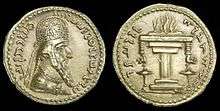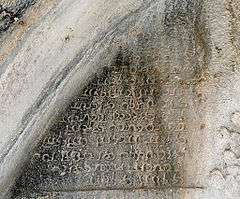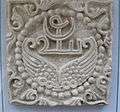Inscriptional Pahlavi
| Inscriptional Pahlavi | |
|---|---|
 Coin of Ardashir I (r. 224–42) with Inscriptional Pahlavi writings | |
| Type | |
| Languages | Middle Iranian languages |
Time period | 171–38 BC |
Parent systems |
Aramaic alphabet
|
| Direction | Right-to-left |
| ISO 15924 |
Phli, 131 |
Unicode alias | Inscriptional Pahlavi |
| U+10B60–U+10B7F | |
Inscriptional Pahlavi is the earliest attested form of Pahlavi scripts, and is evident in clay fragments that have been dated to the reign of Mithridates I (r. 171–38 BC). Other early evidence includes the Pahlavi inscriptions of Arsacid era coins and rock inscriptions of Sassanid kings and other notables such as Kartir. This script contains 19 characters which are not joined.[1]
Gallery
 Inscriptional Pahlavi text from Shapur III at Taq-e Bostan, 4th century
Inscriptional Pahlavi text from Shapur III at Taq-e Bostan, 4th century.jpg) Kartir's inscription at Naqsh-e Rajab
Kartir's inscription at Naqsh-e Rajab Sasanian relief with Inscriptional Pahlavi monogram.
Sasanian relief with Inscriptional Pahlavi monogram.
Unicode
Main article: Inscriptional Pahlavi (Unicode block)
| Inscriptional Pahlavi[1][2] Official Unicode Consortium code chart (PDF) | ||||||||||||||||
| 0 | 1 | 2 | 3 | 4 | 5 | 6 | 7 | 8 | 9 | A | B | C | D | E | F | |
| U+10B6x | 𐭠 | 𐭡 | 𐭢 | 𐭣 | 𐭤 | 𐭥 | 𐭦 | 𐭧 | 𐭨 | 𐭩 | 𐭪 | 𐭫 | 𐭬 | 𐭭 | 𐭮 | 𐭯 |
| U+10B7x | 𐭰 | 𐭱 | 𐭲 | 𐭸 | 𐭹 | 𐭺 | 𐭻 | 𐭼 | 𐭽 | 𐭾 | 𐭿 | |||||
| Notes | ||||||||||||||||
References
This article is issued from Wikipedia - version of the 11/11/2016. The text is available under the Creative Commons Attribution/Share Alike but additional terms may apply for the media files.